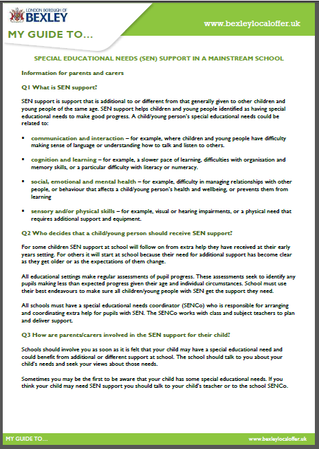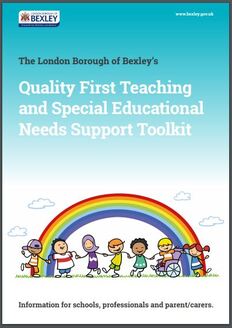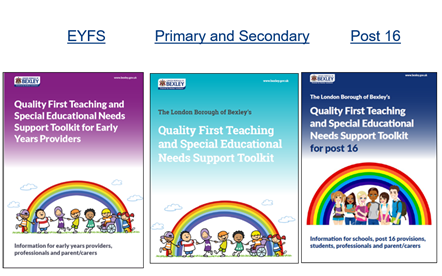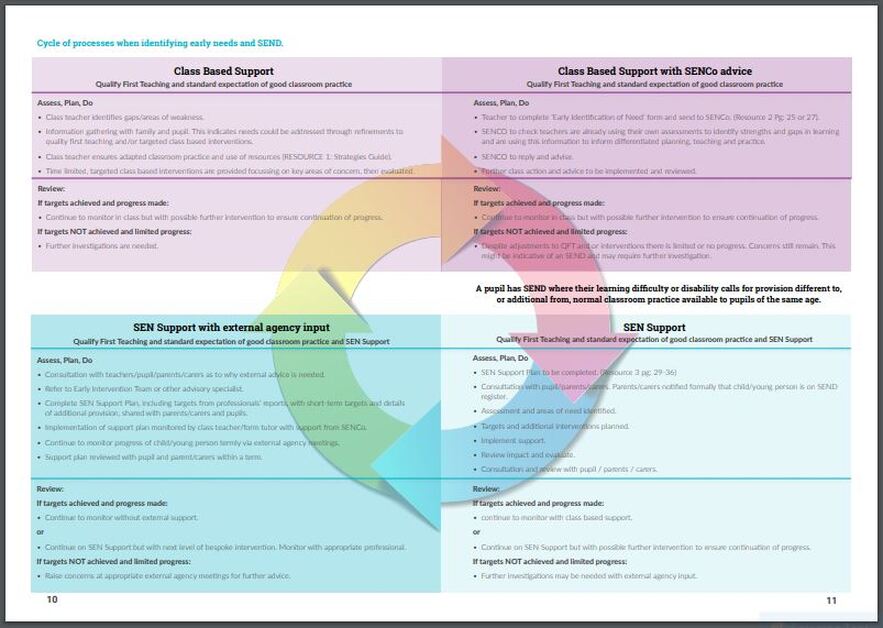Special Educational Needs (SEN) Support in Bexley
With the introduction of the Children and Families Act in September 2014, there has been many changes to the way children and young people with special educational needs and disabilities (SEND) are supported.
Not all children and young people will meet the criteria for an Education. Health and Care (EHC) Plan, however their school or college may be able to meet their individual needs without one.
Not all children and young people will meet the criteria for an Education. Health and Care (EHC) Plan, however their school or college may be able to meet their individual needs without one.
Most children and young people with special educational needs (SEN) or a disability will attend mainstream schools. Guidance to schools on their legal duties is contained in section 6 of the special educational needs and disability code of practice: 0-25 years.
The Code says that schools must:
How do I know if my child is on SEN Support?
If you are unsure, ask the school SENCO. Most SENCO's would discuss this with the child's parents in advance but if you are not sure, then ask for a meeting.
Where can I get more information and advice?
Contact the Bexley IASS service: https://www.bexleyiass.co.uk/
Visit the Bexley Local Offer website: http://www.bexleylocaloffer.uk/
The Code says that schools must:
- Use their best endeavours to make sure that a child with SEN gets the support they need – this means doing everything they can to meet children and young people’s SEN. (SEND Code of Practice section 6.2)
How do I know if my child is on SEN Support?
If you are unsure, ask the school SENCO. Most SENCO's would discuss this with the child's parents in advance but if you are not sure, then ask for a meeting.
Where can I get more information and advice?
Contact the Bexley IASS service: https://www.bexleyiass.co.uk/
Visit the Bexley Local Offer website: http://www.bexleylocaloffer.uk/
|
'MY GUIDES'
Bexley Voice have co-produced a series of guides for parents and carers on various subjects, including SEN SUPPORT. View and download all the My Guides by clicking here or click the picture on the right to view or download our My Guide to SEN Support in Bexley. |
Bexley LA Quality First Teaching and SEN Support Toolkit:
Bexley LA have produced three excellent toolkits to support Bexley mainstream settings ensuring a consistent approach when identifying pupil's barriers to learning and/or special education needs.
Principles of all 3 toolkits are the same……
In order to measure any difference access to the Toolkit may have, we need to establish a baseline to measure against.
We hope you will be happy to help us do this.
If you have a child who is receiving additional support where they are educated (but does not have an EHC Plan), it would be very helpful if you could answer 3 questions in our parent/carer survey by clicking here:
Bexley LA have produced three excellent toolkits to support Bexley mainstream settings ensuring a consistent approach when identifying pupil's barriers to learning and/or special education needs.
Principles of all 3 toolkits are the same……
- Using good QFT strategies as soon as difficulties arise.
- Consistency in identifying SEND across all our settings from 0-25 years
- Monitoring any the impact of any support given using the graduated approach.
- Encouraging the use of SEN Support Plans
- Ensuring pupil/parent/carer voice is heard
In order to measure any difference access to the Toolkit may have, we need to establish a baseline to measure against.
We hope you will be happy to help us do this.
If you have a child who is receiving additional support where they are educated (but does not have an EHC Plan), it would be very helpful if you could answer 3 questions in our parent/carer survey by clicking here:
Paper copies can be collected from Bexley Voice events – please see our website pages for details of our Tea and Talk parent group and events.
In educational settings, a single category called SEN support replaced School Action and School Action Plus. Schools must identify pupils who have SEN and need extra help through SEN support. They should record this in the school records. They must tell you if they are making special educational provision for your child.
Schools must have a Special Educational Needs Coordinator (SENCO) who is responsible for arranging and coordinating extra help for pupils with special educational needs. The SENCO works with class and subject teachers to plan and deliver support.
The SEND Code of Practice says that schools should use a four-part cycle (Assess, Plan, Do and Review) to support your child with special educational needs (SEN). This means that the SENCO and teaching staff should identify support for your child's progress, put this support in place, and regularly check how well it is working, so that they can change the amount or kind of support if they need to.
The school can ask specialist support services, such as educational psychology or speech and language therapy, to provide further advice and support if necessary. Schools should involve specialists if your child continues to make little progress or work at substantially lower levels than expected. (SEND Code of Practice, sections 6.72 and 6.73).
In Bexley, your child's school will have contact with the Early Intervention Team (EIT's).
If your child is being discussed at a school EIT's team meeting, they would have previously informed you to gain parental consent.
Schools must have a Special Educational Needs Coordinator (SENCO) who is responsible for arranging and coordinating extra help for pupils with special educational needs. The SENCO works with class and subject teachers to plan and deliver support.
The SEND Code of Practice says that schools should use a four-part cycle (Assess, Plan, Do and Review) to support your child with special educational needs (SEN). This means that the SENCO and teaching staff should identify support for your child's progress, put this support in place, and regularly check how well it is working, so that they can change the amount or kind of support if they need to.
The school can ask specialist support services, such as educational psychology or speech and language therapy, to provide further advice and support if necessary. Schools should involve specialists if your child continues to make little progress or work at substantially lower levels than expected. (SEND Code of Practice, sections 6.72 and 6.73).
In Bexley, your child's school will have contact with the Early Intervention Team (EIT's).
If your child is being discussed at a school EIT's team meeting, they would have previously informed you to gain parental consent.
Bexley's Early Intervention Team
There are four Early Intervention Teams covering all local authority linked schools in Bexley, and each team serves a cluster of schools geographically located in different parts of Bexley. All teams are based at the Civic Offices, 2 Watling Street, Bexleyheath. Some team members also work in some of the academies. The teams are managed by the Principal Educational Psychologist who is also head of the Early Intervention Teams and the Specialist Teaching Service.
Each team is staffed by the following specialists:
Please click the link below for more details about the EIT's team.
http://www.bexleylocaloffer.uk/Services/5478
There are four Early Intervention Teams covering all local authority linked schools in Bexley, and each team serves a cluster of schools geographically located in different parts of Bexley. All teams are based at the Civic Offices, 2 Watling Street, Bexleyheath. Some team members also work in some of the academies. The teams are managed by the Principal Educational Psychologist who is also head of the Early Intervention Teams and the Specialist Teaching Service.
Each team is staffed by the following specialists:
- Two Team Managers (responsible for two teams each)
- Educational Psychologists
- Social Emotional Mental Health (SEMH) Support Teachers
- Education Welfare Officers (EWOs)
- AEN/SEN Partners
- SEN Advice and Moderation Partners
- Social Workers
Please click the link below for more details about the EIT's team.
http://www.bexleylocaloffer.uk/Services/5478
ASSESS, DO, PLAN, REVIEW - photo taken from the Bexley LA SEN Toolkit.
How often should I be informed of my child's progress?
The school should draw up a plan, involving you and your child, focusing on the outcomes your child needs and wants to achieve and detailing how the school will support them to achieve these. Schools should record details of the actions they are taking under SEN support. It is up to schools to decide how to keep their records but they should be able to provide clear and accessible information to you about your child’s support and progress.
Schools should meet with parents at least three times a year to review how your child is progressing. This should be in addition to scheduled parents’ evening meetings. The school must provide a report at least once a year on your child's progress. If your child isn't making the expected progress, you or the school can ask for an Education, Health and Care Plan Needs Assessment.
How will I know what help or support my child’s school can provide?
Each school is required to provide a SEN Information Report (SEND Code Of Practice section 6.79).
More detailed information can be found in the Bexley LA SEN Toolkit - see above information.
This must include:
• The kind of SEN the school provides for.
• Policies for identifying children and young people with SEN and assessing their needs, including the name and contact details for the Special Educational Needs Coordinator (SENCO).
• Arrangements for consulting parents of children with SEN and involving them in their child’s education.
• Arrangements for assessing and reviewing children’s progress towards outcomes.
• Arrangements for children and young people moving between phases of education and in preparing for
adulthood.
• Approach to teaching, the expertise and training of school staff and how specialist expertise will be available.
• Support for improving emotional and social development, including listening to the views of children
with SEN and measures to prevent bullying.
• How children with SEN are supported to access activities in the school that are available to pupils without SEN.
• How the school involves health, social care and local authorities to provide support for families.
• Arrangements for handling complaints from parents of children with SEN.
More information on each individual school, can be found in their SEN Information Report and Policy on their website.
Many pupils with SEN will also be disabled. Under the Equality Act 2010 schools must have an inclusion policy
and accessibility plan setting out how they support special needs/disabled pupils to be included in all the activities of the school.
What should I do if i am not happy with the support my child is getting in school?
Always speak to your child's class teacher, head teacher or SENCo first. It is good idea to have contact by email, as you will have a record of the conversations. You can arrange a meeting to discuss issues, use our meeting checklists to help. If you need information or support, including face-to-face meeting support, get in contact with Bexley's IASS free parent service. Most school's also have parent reps and SEN Governors who you can contact and should list these on their websites.
Got a question on SEN Support?
Call the Contact a Family freephone parent helpline: 0808 808 3555
Email: [email protected]
www.cafamily.org.uk
This information has been taken from Contact A Family's guide to SEN support in education.
You can also download their leaflet below:
| contact_a_family_-_extra_sen_support_in_mainstream_school.pdf |
CONTACT SEN SUPPORT WEBINAR PRESENTATION
This webinar covers: SEND legislation and what it means for your child; The SEND process in schools - identification and support; How should parents be involved etc. Download the presentation from the webinar.
The You Tube video can be viewed below:





